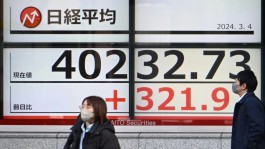Capital Intelligence, the international credit rating agency, affirmed the “long-term” sovereign rating of the UAE’s foreign currencies and local currency at (AA-), while affirming at the same time the short-term rating of foreign currencies and the local currency at (A1+), with a stable future outlook.
As usual, Capital Intelligence's rankings reflect the strength of the UAE's consolidated financial and external position, amid great expectations for maintaining this strength during the next twelve months.
Diversify the economy
According to the international agency, the stable domestic political environment, the country’s high per capita GDP, as well as the UAE government’s ongoing efforts to diversify the economy and improve the structure of the unified budget, support the quality of these classifications.
She said: “The UAE’s external accounts are still very strong, and the current account surplus is expected to remain very high in the period between 2024 and 2025, with an average of 7.6% of GDP.” This is based on expectations that hydrocarbon prices will remain at their upper limits throughout this period, although below their peak in 2022, and that tourism revenues and non-hydrocarbon exports will record strong growth.
Foreign exchange
The country's foreign exchange assets rose to $166.7 billion in October 2023, from $138.5 billion in December 2022, and are expected to cover about 133% of external debt due this year. However, the assets of various sovereign wealth funds in the UAE are much higher, although disclosure is limited.
Capital Intelligence estimates that the Abu Dhabi Investment Authority (ADIA), the largest UAE sovereign wealth fund, alone managed about $790 billion in assets in 2022, and the number is expected to increase significantly in 2023, covering about 1.84 times the total. The country's external debt stock in 2024. While the country's net creditor position cannot be considered an indicator of the solvency risks of individual emirates, the agency expects that the oil-rich emirate of Abu Dhabi will be willing to support federal institutions, including the central bank, if necessary.
Budget surplus
The report noted the UAE's public financial strength, supported largely by high oil and gas revenues, which is expected to achieve a surplus of 4.2% of GDP in 2023, compared to 10.6% in 2022. The consolidated budget surplus is also expected to rise to 4.4% of output in 2024, assuming an average oil price of $75 per barrel, supported by revenues from the 9% corporate tax rate on profits exceeding 375 thousand dirhams, which was implemented in January last year.
The stock of consolidated government debt is expected to decline slightly to 30% of GDP in 2023, compared to 30.2% in 2022 and 35.9% in 2021.
Optimistic economic performance
Meanwhile, Capital Intelligence readings showed a very optimistic economic performance (in the short to medium term) for the UAE, supported by strong local activity and effective reforms within the framework of the UAE’s strategy for the future. Real GDP growth is expected to decline to 3.5% in 2023 (from 7.4% in 2022), with non-oil sectors expanding rapidly. Real output is also expected to expand by an average of 4.1% in the period 2024-2025, reflecting strong growth in the non-oil sector.
Despite the favorable growth outlook, risks could stem from uncertainties related to the fallout from slowing global economies and tense geopolitical conditions. In this regard, the agency indicates that implementing reforms based on the UAE's strategy for the future can help reduce the economic risks resulting from dependence on oil and gas.








































